The COVID-19 pandemic has further highlighted the importance of health in a world of sweeping changes. Founded in 2002, the Institute of Chinese Medical Sciences (ICMS) of the University of Macau (UM) is dedicated to quality research of Chinese medicine and the deep integration of innovative concepts, technologies, as well as research and development (R&D). Over the last two decades, the institute has produced many research results with global relevance and has built a unique system for cultivating innovative talent that can satisfy international standards. Through this system, the institute has produced a great number of outstanding professionals in Chinese medicine for Macao and the rest of the country to contribute to human well-being. In the future, the institute will continue to uphold its motto of ‘seeking innovation through tradition’, promote technological innovation and research results transfer in Chinese medicine, and pave the way for innovation based on traditional Chinese medicine (TCM) as well as the modernisation and internationalisation of the industry.
Founding Stage: Establishing a System for Innovative Research and Talent Development in Chinese Medicine
Wang Yitao, a Chinese medicine expert, came to Macao at the university’s invitation two decades ago to set up the ICMS. He guided the institute through several stages of growth, from converting an old dormitory on the old campus into a laboratory to launching Chinese medicine research in Macao and creating a system for nurturing innovative researchers which can meet international standards. As the founding director and chair professor of the ICMS, Prof Wang says, ‘The standardisation, internationalisation and modernisation of Chinese medicine have been at the heart of all we do since the very first day. Our commitment to conducting innovative TCM studies and producing excellent research outcomes has never faltered.’
Prof Wang adopts a meticulous approach to research and education. Soon after taking office as director of the ICMS, he identified the mission of the institute: combining traditional Chinese medicine with advanced theories and methodologies in biomedical sciences to produce innovative, interdisciplinary Chinese medicine professionals with an international perspective. He believes there is an urgent need for globally-oriented technology and management experts in Macao and mainland China to promote the development of the Chinese medicine and the biomedical technology industries. To develop a system for training biomedical professionals in Macao, the institute in 2002 launched two master’s degree programmes, in Chinese medical sciences and medicinal administration, respectively. A PhD programme and Macao’s first bachelor’s degree programme in biomedical sciences were then launched in 2004 and 2011 respectively, with the latter being included in the curriculum of the Faculty of Health Sciences (FHS) in 2015. Through these programmes, the ICMS aims to build a talent pool for the development of the Chinese medicine industry in Macao.
Development Opportunities: National Support to Elevate the Quality of Research
The institute’s tenth anniversary marked a quantum leap forward. ‘As UM relocated to its current campus on Hengqin island in 2014, our institute also moved from the cramped quarters of the old dormitory into the new Research Building, where we have access to more advanced facilities,’ says Prof Wang. ‘Members of our teaching and research team share a common goal. We want to conduct more cutting-edge studies and nurture more outstanding talent by taking advantage of the vastly improved environment on the new campus.’
Led by Prof Wang, the ICMS has vigorously pushed the frontiers of knowledge over the past two decades, with achievements recognised by academic peers around the world and state leaders who visited UM. In 2008, a team of Chinese medicine scholars from Macao, led by Prof Wang, applied to the Ministry of Science and Technology for the establishment of a state key laboratory in Chinese medicine quality research. The application was approved in 2010 and the first state key laboratory in the field of Chinese medicine in the country, the State Key Laboratory of Quality Research in Chinese Medicine (SKL-QRCM), was established in Macao.
Prof Wang served as the founding director of the SKL-QRCM. ‘Our vision was to build a world-class platform for quality research in Chinese medicine and R&D of innovative products, with the aim of nurturing innovative Chinese medicine professionals, promoting the internationalisation of Chinese medicine, and using the results of our research to support the development of the Chinese medicine industry,’ says Prof Wang. ‘The key laboratory has laid a good foundation for improving quality research in Chinese medicine and establishing international standards.’
Since its establishment, the lab has been dedicated to the quality analysis of Chinese herbal medicines and the creation of international standards for these medicines. ‘For Chinese medicines to be manufactured, sold and used worldwide, they must have internationally recognised quality standards that define which active ingredients are quality indicators,’ says Prof Wang. For this reason, the state key lab has established joint laboratories with all three regulatory bodies in the US, Europe, and China, namely the United States Pharmacopoeia Convention (USPC), the European Pharmacopoeia Commission (Ph. Eur. Commission), and the Chinese National Institutes for Food and Drug Control. The lab has also set quality standards for more than 20 Chinese medicinal herbs for authoritative publications such as United States Pharmacopeia (USP), European Pharmacopoeia (Ph. Eur.), and Chinese Pharmacopoeia (ChP). The herbs include Panax notoginseng (Sanqi), Mai Dong, Lycium barbarum (Goji), Cordyceps militaris, powders of fermented Cordyceps sinensis, Galangal, Dendrobium officinale, Pogostemon cablin, and Phyllanthus emblica.
The ICMS and the SKL-QRCM focus on improving the efficacy, safety, stability, and controllability of Chinese medicine and have produced fruitful results and won numerous awards. In 2016, a research project using DNA barcoding technology to identify the species of medicinal herbs, conducted by UM, Peking Union Medical College, and several other institutions, received a second prize of the State Scientific and Technological Progress Award. In 2019, two inventions developed by a group of researchers from the SKL‐QRCM—one is a series of innovative Chinese herbal products and the other is a zebra sh screening system based on microfluidic technology— won gold awards at the International Exhibition of Inventions of Geneva. The former project included six products in two forms: solid‐liquid capsule form and granule form. It was the first time that an innovative product in Chinese medicine from Macao had won this award. Moreover, the SKL-QRCM was awarded the Medal of Merit – Professions for 2021 by the Macao SAR government.
The academic achievements of the ICMS over the past two decades have resulted in over 3,000 articles in SCI-indexed journals, which have been cited over 68,000 times to date. 140 patents have already been filed in countries and regions such as mainland China, the US, and the EU. In recent years, the institute has used new technologies such as artificial intelligence to seek breakthrough developments in drug discovery, drug delivery and quality standards research. In addition, the institute launched the international scientific journal Chinese Medicine in 2013. Edited by Prof Wang and published by the top academic publisher Spring Nature in London, the journal is now the SCI-indexed journal with the highest impact factor in the field of Chinese medicine. Prof Wang was awarded the Medal of Merit – Education for 2011 by the Macao SAR government in recognition of his achievements in teaching and research as well as outstanding contributions to the institute.
Ready for Development: Promoting the Chinese Medicine Industry in Macao
In recent years, the ICMS has made it its mission to develop the Chinese medicine industry in Macao. In doing so, it has been actively grasping the new opportunities brought by various policies and collaborating with renowned pharmaceutical companies to promote the transfer of innovative research results to support the development of the industry. With the support of the Science and Technology Development Fund of Macao, the Macao SAR government approved the establishment of the Macao Centre for Research and Development in Chinese Medicine, the first platform for the translation of innovative R&D results in Macao, of which Prof Wang is the director. He says: ‘Chinese medicine R&D and manufacturing is the current focus of industrial development in Macao. In the Second Five-Year Plan for Economic and Social Development of the Macao Special Administrative Region (2021-2025), it is proposed to give full play to the Macao Centre for Research and Development in Chinese Medicine to enhance its function as a platform and strengthen the collaborative innovation mechanism,’ says Prof Wang. ‘We will focus on quality research as well as product R&D and result transfer by using the centre as a platform for industry-academia collaborative innovation.’
At the Macao Centre for Research and Development in Chinese Medicine, UM researchers collaborate with their counterparts from leading pharmaceutical companies ranked among the top 500 in the world, the China Academy of Chinese Medical Sciences, and the Centre for Chinese Herbal Medicine Drug Development in Hong Kong to develop products for the global market in Macao using modern manufacturing processes. UM and Guangzhou Pharmaceutical Holdings Limited have established a joint laboratory for the industrial transformation of Chinese medicine, and set up the first GMP Chinese medicine pharmaceutical factory in Macao in 2021.
‘With the support of the Macao SAR government, the Macao Centre for Research and Development in Chinese Medicine has invited pharmaceutical companies that are among the top 500 in the world to turn their results into products in Macao,’ says Prof Wang. ‘The centre has collaborated with companies such as Guangzhou Pharmaceuticals, China Resources Sanjiu, and Pientzehuang Pharmaceutical on the R&D of various classic Chinese medicine recipes, and one of the R&D results has been launched on the market in Macao.’
In addition, a team led by Prof Wang Chunming in the ICMS has developed three products based on polysaccharides derived from Chinese medicinal herbs, namely a dressing for diabetic foot ulcers, a glucomannan coating for bone tissue regeneration, and an alcohol-free and rinse-free antibacterial moisturising hand gel. The research results are currently being transferred by Genetrump Co, Ltd, a start-up company partly owned by UMTec Limited. After nearly ten years of hard work in R&D, the research team has made significant progress and established the aforementioned start-up company in 2017. The project is a representative result of industrial development in Chinese medicine between Guangdong and Macao.
In addition, the Macau Institute for Translational Medicine and Innovation (MITMI) was established at UM in December 2021. At MITMI, many ICMS researchers focus on developing medical and healthcare products, promoting innovation, and transferring results in medical science and technology to increase the effectiveness of prevention and treatment in the GBA. In the same year, UM inaugurated an R&D centre for Chinese medicine and translational medicine under the Zhuhai UM Science & Technology Research Institute to further promote the development of technological innovations in Chinese medicine and translational medicine to facilitate Macao’s economic diversification and the transformation and upgrading of industries in Zhuhai.
Prof Chen Xin, an expert in Chinese medicine and immunology, has been the director of ICMS and interim director of SKL-QRCM (UM) since 2022. According to him, to support the development of Chinese medicine in Macao, the institute has started preparations for the establishment of the Macao Centre for Testing of Chinese Medicine, UM, in 2022. This centre will be accredited by the China National Accreditation Service for Conformity Assessment to conduct tests for herbal Chinese medicines and proprietary Chinese medicines on behalf of the Pharmaceutical Administration Bureau (ISAF) of the Macao SAR government. In addition, ICMS professors have served the community with their expertise as members of many government committees on medical and pharmaceutical affairs.’We will actively promote the development of the Macao Centre for Testing of Chinese Medicine to further improve the Chinese medicine R&D platform, promote industry-academia collaboration in Chinese medicine, and support projects with prospects for commercialisation and higher technological maturity through the ICMS,’ says Prof Chen. ‘We aim to promote the Chinese medicine industry in Macao through research and industry-academia collaboration.’
To promote the development of the Chinese medicine industry, the ICMS requires the support of a strong teaching and research team. Today, the institute is home to 37 academic staff members, 16 administrative and technical staff members, five research assistant professors, more than 20 postdoctoral researchers, and about 50 research assistants. A total of 329 students are enrolled in the institute’s postgraduate programmes, namely the Doctor of Philosophy in Biomedical Sciences, the Master of Philosophy in Chinese Medicinal Science, and Master of Philosophy in Medicinal Administration. These programmes are mainly taught in English and aim to train researchers with excellent academic expertise and the ability to collaborate internationally in research.
With the intensified development of Macao’s health industry with Chinese medicine R&D and manufacturing as an entry point, the ICMS is also collaborating with the FHS to offer the Bachelor of Science in Pharmaceutical Sciences and Technology programme. The institute is also preparing to launch the Master of Science in Medicinal Administration programme in the 2023/2024 academic year. ‘Over the years, the ICMS has produced more than 800 graduates, many of whom are now working in senior management positions in well-known universities, pharmaceutical companies, hospitals, health or drug regulatory authorities, or industrial parks in Macao, mainland China, or other parts of the world. Some of them have even established biotechnology companies in the Guangdong-Macao In-depth Cooperation Zone in Hengqin in recent years,’ says Prof Chen.
The ICMS also provides education on Chinese medicine at various levels, including popularisation activities for adolescents, in which over 30,000 people have participated over the years. In addition, the institute offers courses on Chinese medicine to UM students in various faculties. In these courses, students can gain insights into the classics of TCM, the theory and practice of acupuncture, the production of TCM formulas, and the modernisation of TCM.
Vision for the Future: Promoting Chinese Medicine to the World with the Spirit of ‘Seeking Innovation through Tradition’
The ICMS will continue to expand its international network of collaboration, which already includes over 100 leading universities, research institutes, and hospitals in countries and regions such as mainland China, Hong Kong, Taiwan, Singapore, the UK, France, Germany, the Netherlands, Sweden, Norway, the US, and Canada. To celebrate its 20th anniversary, the institute hosted the Macao Forum of Quality Research in Chinese Medicine 2022 on 24 October 2022, which was attended by many Chinese medicine experts and guests. According to Prof Chen, the institute and the SKL-QRCM have made outstanding achievements in research, education and community service over the years and have earned a reputation in the international academic community thanks to the support of the central government, the Macao SAR government, and UM, as well as the contribution of all the institute’s staff and students.
China’s 14th Five-Year Plan has laid the groundwork for Macao’s second Five-Year Plan, creating favourable conditions for Macao’s better integration into the country’s overall development on a variety of fronts. Macao and UM are faced with fresh opportunities as the country enters a new phase of development. According to Macao’s second Five-Year Plan, the city strives for promoting economic diversification by further developing the local health industry with Chinese medicine R&D and manufacturing as an entry point, as well as the industries of modern finance, high technology, exhibitions, trade, culture, and sports.
‘The ICMS has always been devoted to promoting the internationalisation of Chinese medicine. We will seize the opportunities arising from the development of our country and the Macao SAR and continue to make the most of our strengths,’ says Prof Chen. ‘We will also continue to uphold the institute’s motto of “seeking innovation through tradition” by producing more innovative R&D results and outstanding talent in Chinese medicine to support the development of the health industry, promote Chinese medicine, and build a healthy society.’
Brief Introduction of the Institute of Chinese Medical Sciences
Established in 2002, the Institute of Chinese Medical Sciences aims to promote the standardisation, internationalisation and modernisation of Chinese medicine, develop a unique system for nurturing innovative talent, and create a world-class platform for international collaboration on technological innovation in Chinese medicine. In 2010, the Ministry of Science and Technology approved the establishment of the State Key Laboratory of Quality Research in Chinese Medicine, the first state key laboratory in the field of Chinese medicine. Revolving around quality research and with the state key lab as a vehicle, the institute has built advanced research platforms that focus on the efficacy, safety, stability, and controllability of Chinese medicine. In terms of innovative research, talent development, and community services, the institute has also achieved outstanding results. As of 2022, the institute has produced over 800 high-quality Chinese medicine professionals, published over 3,000 articles in SCI-indexed journals, and established quality standards for more than 20 Chinese medicinal herbs for authoritative publications such as United States Pharmacopeia (USP), European Pharmacopoeia (Ph. Eur.), and Chinese Pharmacopoeia (ChP) to facilitate the standardisation and internationalisation of Chinese medicine. Members of the institute also received a second prize of the State Scientific and Technological Progress Award and more than ten prizes at the Macao Science and Technology Awards. In 2020, the Macao Centre for Research and Development in Chinese Medicine was established to bring pharmaceutical companies ranked among the top 500 in the world to Macao to transform their research results in Chinese medicine into products.
Milestones of the Institute of Chinese Medical Sciences
2002
- UM established the Institute of Chinese Medical Sciences (ICMS) and launched two master’s degree programmes, in Chinese medicinal science and medicinal administration, respectively
2004
- ICMS launched a PhD programme in biomedical sciences
2010
- The Ministry of Science and Technology approved the establishment of the State Key Laboratory of Quality Research in Chinese Medicine (SKL-QRCM)
2011
- ICMS launched a bachelor’s degree programme in biomedical sciences (which was included in the curriculum of the Faculty of Health Sciences (FHS) in 2015)
- ICMS Founding Director and Chair Professor Wang Yitao was awarded the Medal of Merit – Education by the Macao SAR government
2013
- ICMS launched the international journal Chinese Medicine
2016
- ICMS members received a second prize of the State Scientific and Technological Progress Award
2020
- Macao Centre for Research and Development in Chinese Medicine was established
2021
- A research and development centre for Chinese medicine and translational medicine under the Zhuhai UM Science & Technology Research Institute was established
- SKL-QRCM of UM was awarded the Medal of Merit – Professions by the Macao SAR government
2022
- ICMS and FHS jointly launched the Bachelor of Science in Pharmaceutical Sciences and Technology programme
- ICMS began preparations for the establishment of the Macao Centre for Testing of Chinese Medicine, University of Macau
- ICMS reached the milestone of its 20th anniversary
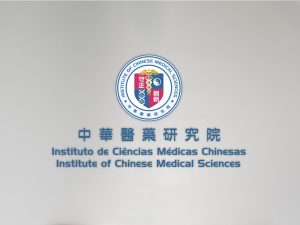
ICMS has reached its 20th anniversary and will continue to adhere to its motto of ‘seeking innovation through tradition’ in the promotion of Chinese medicine
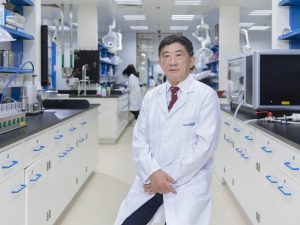
Prof Wang Yitao
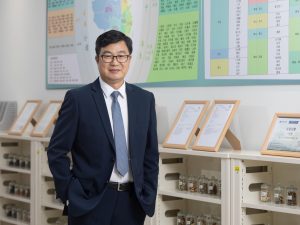
Prof Chen Xin
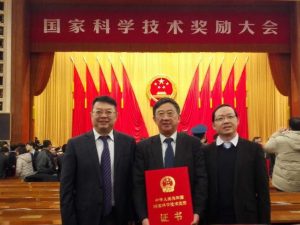
A research project conducted by UM, Peking Union Medical College, and several other institutions, received a second prize of the State Scientific and Technological Progress Award

SKL-QRCM was awarded the Medal of Merit – Professions for 2021 by the Macao SAR government. Prof Wang Yitao received the award on behalf of the lab

ICMS and SKL-QRCM are located in the Research Building with state-of-the-art equipment
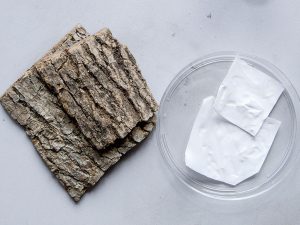
A study in dressing for diabetic foot ulcers has made significant progress after ten years of hard work
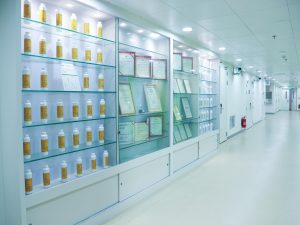
Some of the research achievements of ICMS

A research and development centre for Chinese medicine and translational medicine under the Zhuhai UM Science & Technology Research Institute
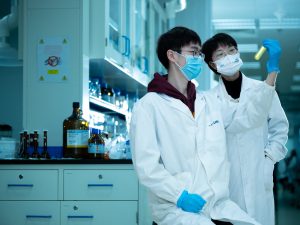
ICMS has launched new programmes in recent years to nurture Chinese medicine professionals for the industry
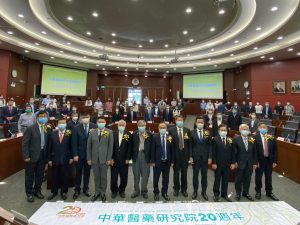
ICMS holds the Macao Forum of Quality Research in Chinese Medicine 2022 to celebrate its 20th anniversary
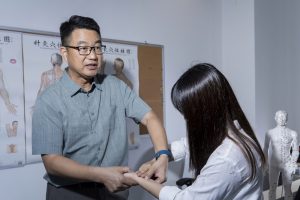
Prof Chen Xin teaches acuperntuce in a general education course in traditional Chinese medicine
